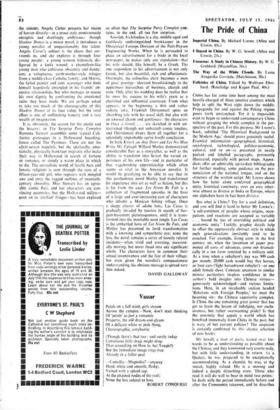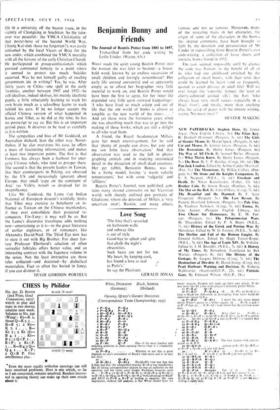The Pride of China
Imperial China. By Michael Loewe. (Allen and Unwin, 45s.) I Stayed in China. By W. G. Sewell. (Allen and Unwin, 25s.)
Formosa: A Study in Chinese History. By W. G Goddard. (Macmillan, 36s.)
The Way of the White Clouds. By Lama Anagarika Govinda. (Hutchinson, 50s.) Folktales of China. Edited by Wolfram Eber- hard. (Routledge and Kegan Paul, 40s.)
CHINA has for some time been among the most heavily-charged of those emotive counters which help to split the West right down the middle. Propaganda for and against the Peking regime pours forth unstanched. Yet it is impossible even to begin to understand contemporary China without grasping the whole complex in the per- spective of the past. For this purpose, Mr Loewe's book, subtitled 'The Historical Background to the Modern Age,' should prove genuinely useful. Essential information—geographical, historical, sociological, technological, politico-economic, cultural, and so on—is presented in neatly packed and labelled paragraphs, pertinently illustrated, especially with period maps. Appen- dices offer an admirably up-to-date bibliography for further reading, some guidance on the pro- nunciation of the national tongue, and on the structure of the written script. Mr Loewe shows how the latter alone conferred geographical unity, historical continuity, over an area other- wise almost as diverse as India or Europe, where our alphabets have in fact been divisive.
But what is China? Try for a coca definition, and you will find it hard to better Mr Loewe's: 'a sub-continent of peoples whose origins, occu- pations and reactions are accepted as variable . . . bound by ties of overriding political and economic unity.' Luckily, graphic details help to offset the oppressively abstract style in which such generalisations inevitably tend to be couched. For example, living costs in the first century AD, when the invention of paper pro- moted all sorts of advances, come out dramati- cally in a tax form remitted by a military unit. At a time when a subaltern's pay was 900 cash per month, 20,000 cash would buy five horses, or four cars (light horsedrawn vehicles')—or one adult female slave. Constant attention to similar minute particulars inspires confidence in the author's bold insights into Chinese virtues— generously acknowledged—and vicious limita- tions. Here, in an invaluable section headed 'Relations with Foreign Peoples,' we meet the besetting sin: the Chinese superiority complex. Is China the one remaining great power that has yet to learn the lesson of indulging, not exclu- siveness, but rather overweening pride? Is that the enormity that appals a world which has benefited immensely from China in the past, but is wary of her current policies? The suspicion is certainly confirmed by this chance selection Of new books.
Mr Sewell, a man of parts, leaned over for- 'wards to be as understanding as possible about the Chinese, and they kowtowed very courteously, but with little understanding, in return As a Quaker, he was prepared to be exceptionally accommodating. As a chemist, he was, at the outset, highly valued. His is a moving and indeed a deeply disturbing story. Those who read it will do well th bear in mind two, points: he deals with the period immediately before and after the Communist takeover, and he describes
life in a university off the beaten track, in the vicinity of Chungking in Szechhan. So the take- over was peaceful : the YMCA Christianity of that poster-hero of the Second World War, Chiang Kai-shek (have we forgotten?), was easily jettisoned by the local Vicars of Bray for the new order, which combined the YMCA morality with all the fervour of the early Christian Church. He participated in group-confessionals which pursued communal honesty to a point where it seemed to protest too much. Suicides occurred. Was he not himself guilty of stealing government ink in writing? Yes, he was. After thirty years in China-one spell in the early 'twenties, another between 1947 and I952-he still idealises, indeed idolises, his mainly idealistic pupils, a little reluctantly learning to wash his own brain much as a schoolboy learns to wash behind his ears. If he no longer accepts the official Chinese version of what happened in Korea and Tibet, as he did at the time, he has no postscript to say so. But this is an important period piece. It deserves to be read as carefully as it is written.
The sympathies and bias of Mr Goddard, an Australian diehard, lean the other way. Never- theless, if he also overstates his case, he offers a mass of fascinating information, and makes at least two important points. The first is that Formosa has always been a harbour for ener- getic Chinese rebels, who tend to prosper there. The second is that the present leaders in Taiwan, like their counterparts in Peking, are obsessed by the US and increasingly ignorant about Europe, that small 'cape on the continent of Asia' (as Valery noted) so despised for its insignificance.
Like Mr Goddard, the Lama ran Indian National of European descent') wishfully thinks that Tibet may exercise as beneficent an in- fluence as Taiwan on the Chinese mainlanders, if they ever consolidate their projected re- conquests. Yin-Yang: it may well be so. But the Lama's discursive travelogue adds nothing new-entertaining as it is-to the great literature of earlier explorers, or of romancers like Alexandra David-Neel. The Third Eye now has to stare it out with Big Brother. For sheer fan- tasy Professor Eberhard's selection of often surrealist folktales offers better value, and an interesting contrast with the Japanese volume in the series. Not the least instructive are those tales collected-and doctored-by dialectical materialists. Fact so often lies buried in fancy, if you can disinter it.
HUGH GORDON PORTEUS































 Previous page
Previous page